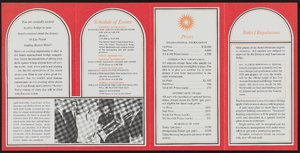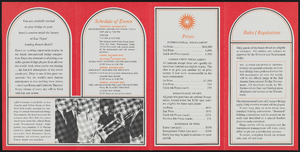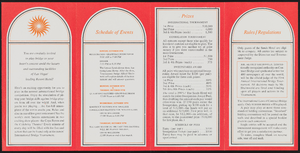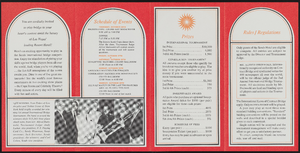Search the Special Collections and Archives Portal
Search Results
Ffolliott "Fluff" LeCoque Papers
Identifier
Abstract
Collection is comprised of Ffolliott "Fluff" LeCoque's professional and personal papers (1879-2015), documenting her life and career working as a dancer and later as company manager for Las Vegas entertainment productions; most notably the long-running Jubilee! show produced by Donn Arden for the MGM Grand and Bally's Hotel-Casinos. Materials include personal letters, drawings, professional papers, newspaper clippings, photographs, magazines, commericially produced sheet music, and related ephemera.
Archival Collection
"On the Record" and "Newsmakers" interviews with Bob Stupak: video
Date
Archival Collection
Description
Channel 8 "On the Record" interview with Bob Stupak; he shares his background and first coming to Las Vegas; developing and promoting his Vegas World casino; relationship with press and media; Superbowl $1 million dollar bet; challenging Donald Trump; developing the concept for the Stratosphere Tower; Tower height controversy; experience owning and running the Las Vegas Bullet newspaper; personal heros; predictions for the future of Las Vegas; Second half is Channel 13 "Newsmakers" interview with Bob Stupak discuss Stratosphere design; predictions for success of the tower; aviation/tower height controversy. Original media VHS, color, aspect ratio 4 x 3, frame size 720 x 486. From the Bob Stupak Professional Papers (MS-01016) -- Professional papers -- Audiovisual material -- Digitized audiovisual clips file.
Moving Image
Arnie and Sheila Wexler Professional Papers
Identifier
Abstract
The Arnie and Sheila Wexler Professional Papers consist of the professional materials dating from 1976 to 2006 of Arnie and Sheila Wexler, compulsive gambling counselors from New Jersey. The papers include documents, articles, videotapes, and audiocassettes on various aspects of problem, compulsive, and pathological gambling.
Archival Collection
Digital images of Fotine, friends, and fellow musicians performing, approximately 1940 to 1969
Level of Description
Archival Collection
Collection Name: Larry Fotine Music collection
Box/Folder: Digital File 00
Archival Component
Paul and Sari Aizley oral history interview
Identifier
Abstract
Oral history interview with Paul and Sari Aizley conducted by Barbara Tabach on November 13, 2015 and December 01, 2015 for the Southern Nevada Jewish Heritage Project. Paul and Sari discusses their long history of civic contributions to Las Vegas, Nevada and being active in the Jewish community.
Archival Collection
Regional subject files, 1859, 1908, 1970-2015
Level of Description
Scope and Contents
The regional subject files include materials collected by anthropologist Katherine Spilde about Native American gaming, Native American communities in the United States, and the US and international gaming industries. The materials date from 1859 to 2015, with the bulk of materials dating from 1990 to 2010. Materials dating from the nineteenth and early twentieth centuries are a reproduction of a federal treaty and an ethnohistorical essay. The majority of the materials document Native American gaming following the passage of the 1988 Indian Gaming Regulatory Act. The papers include research and subject files created by Dr. Spilde during her employment with the National Gambling Impact Study Commission (NGISC), National Indian Gaming Association (NIGA), and Harvard Project on American Indian Economic Development (HPAIED). The materials document Native American gaming enterprises both on and off reservations, the socioeconomic impact of gaming, the political history of gaming in the US, and international gaming. The series includes socioeconomic reports, testimonies, correspondence, memos, press releases, photographs, audiovisual materials, promotional materials, brochures, fact sheets, summaries, booklets, pamphlets, advertisements, tourism materials, journal articles, legal briefs, legislative documents, court opinions, notes, presentations, conference materials, periodicals, community newspapers, and newspaper articles.
The collection contains documentation on a number of Native American nations, including the Misi-zaaga'iganiing Anishinaabeg (Minnesota Chippewa Tribe, Mille Lacs Band); Gaa-waabaabiganikaag Anishinaabeg (Minnesota Chippewa Tribe, White Earth Band); Forest County Bodéwadmi (Forest County Potawatomi Community); Ho-Chunk Nation of Wisconsin; Mashantucket Pequot Indian Tribe; Mohegan Tribe of Indians; Tulalip Tribes of Washington; Sisseton-Wahpeton Oyate of the Lake Traverse Reservation; Standing Rock Sioux Tribe of North and South Dakota; Mandan, Hidatsa, and Sahnish (Arikara) (Three Affiliated Tribes of the Fort Berthold Reservation, North Dakota); and Mississippi Band of Choctaw Indians. Other communities are also represented in the series, but to a lesser extent. In addition to materials about gaming and casinos, Dr. Spilde also collected documents, photographs, and audiovisual materials about Native American culture in general. The series documents regional and national trends in Native American gaming, and the greater gaming industry. Materials trace federal and state relationships with individual Native American nations, specifically concerning gaming enterprises.
Archival Collection
Collection Name: Katherine A. Spilde Papers on Native American Gaming
Box/Folder: N/A
Archival Component




